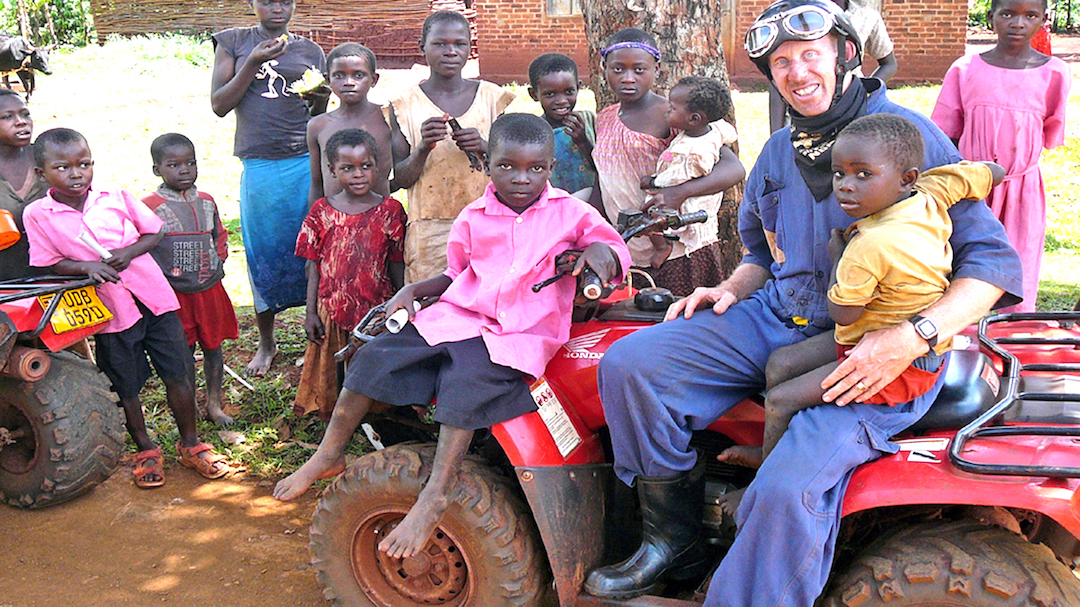
African children who live near Jinja, Uganda, the source of the Nile River, gather around the writer.
(The Hamilton Spectator – Saturday, January 11, 2020)
MUKONO, UGANDA ✦ So I’m back in this East African nation for a working visit. It’s also a good time to get myself unplugged. You know, rested and rebooted. The warm days and the warm people and the children help. If you visit (and why don’t you, sometime?) you’ll know what I mean.
The children of the Nile, among the poorest children on Earth, are especially remarkable. There they are, running in their bare feet, laughing and waving at you. “Mzungu! Mzungu!” they call. You’re a novelty and easily loved, so much that, if you stop, one of them might climb into your arms. This, while we, you and me, go along the Nile River on our quads.
To get these machines we’ll first travel past this Lake Victoria beach town, Jinja. It has an orphanage where my youngest daughter started out in life. Jinja is also the source of the Nile. Then, past what must be the world’s tallest sign for Nile beer, we’ll arrive at the ATV rental. We’ll put on overalls, rubber boots, helmets, goggles and, finally, bandanas, because the dust, so red, will fly.
Out on the four-wheelers we’ll then snake along the Nile, that steady river that once held the life of a Hebrew child named Moses, the Moses of “Let my people go!” renown. We’ll navigate turns and bumps, cut through some dense sugarcane, then open fields where you’ll mind that cow. Slow down through the villages where those children will run to greet you.
Before ending we’ll stop for a soda at a sort of corner store. Here the children will get really interested in you. This is when, with any luck, you’ll especially pause in the moment, in the smell and taste of it, this raw discovery, this spirit of rest, Shabbat.
Over the years I’ve taken various visitors quading along the Nile. So it easily comes to mind while I’m back teaching at the Ugandan university that was my family’s longtime home. My days here are both full and relaxed enough, away from the race of life in North America.
Of course it’s good to be active. Even better to be active with purpose, provided that your time and space don’t get so saturated that you lose the life in living. This is why Shabbat, or Sabbath, is so helpful.
When the ancient Hebrews got a hold of this concept, or it got a hold of them, it was with the thought that we’re human beings, not human doings; that people best find life purpose and meaning by first pursuing wisdom, which includes a divinely inspired rhythm of rest. The idea changed the world, changed cultures. Which is why it can change your world. Or mine.
So let it be. Let your spirit be. Let it be still. Let it be lightened. Let it be childlike. Don’t grind yourself into the dust of the earth. Don’t amuse yourself to death on the stupid stuff, either. Don’t be like those with their heads in the cyber-sand, unaware. You know what I mean. Face forever in the screen. Enslaved. In bondage.
Because isn’t this the defining issue of our time? Being on 24-7? I think it is. Don’t fool yourself. We’re living in an anxiety-making machine, a digitized world with some remarkable advantages, sure, but a world where it’s also easy to lose your peace. And humaneness. So guard you spirit, which, like a child, can be so vulnerable.
This is all my own self-talk, always good to practise. It makes for fine family discussions, too. Ask my own kids. Their Christmas gift for me, travelled over the ocean with me, is the book “24/6.” Writing about this ancient rhythm, author Tiffany Shlain unpacks the power of Sabbath rest, noting how a weekly day off from your device seemingly defies the laws of physics by both slowing time and giving you more time.
And this is a good picture of life here where I sit. The “Mzungus” — that’s me and you, rich foreigner — have the watch. But the Africans have the time. Such a cutting African saying that’s so true. As true as the children of the Nile, who, whether they know it or not, have what’s so valuable. It’s really something to see.

Thank you, Thomas, for another reflective and inspiring column. Hope you have a wonderful visit.
Thanks Norbert – always appreciate hearing from you. Indeed, as usual, my African visit is most wonderful.
Thanks Thom. Didn’t know you were in Uganda. I should have connected
Ah, next time, Emmanuel. Same time, same place, 2021.
So true, the comment about the watch and the time! Thank you for your thoughts!
Funny enough, when just in Uganda, my watch broke. How fitting.